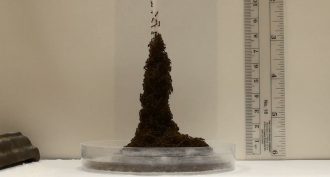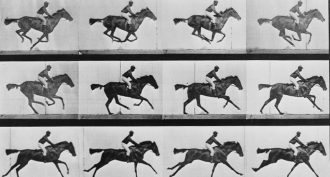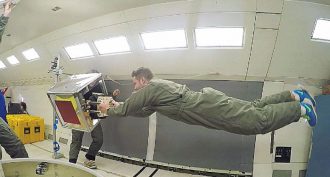Tech
-
 Computing
ComputingVideo games level up life skills
A new study shows that playing video games can sharpen important life skills, including communication, adaptability and resourcefulness.
-
 Tech
TechSpying on brains in action
New tools let scientists see inside the brain and nervous system as their research subjects move around.
-
 Physics
PhysicsThe quantum world is mind-bogglingly weird
At the smallest scales, particles are ghostly and ill-behaved. No one understands them, but that doesn’t keep scientists from trying.
-
 Animals
AnimalsThree simple rules guide fire ants in building towers
Fire ants build towers of ants to protect themselves during a flood. New research reveals the simple rules that guide how they do this, no foreman needed.
-
 Tech
TechMeet the world’s smallest monster trucks
These DNA-scale nano-vehicles surprised chemists. The bonds that hold their atomic building blocks in place grip the wheels more strongly than anyone had expected.
-
 Fossils
FossilsT. rex may not have been able to run — but it was still pretty fast
T. rex was fearsome, but its leg bones may not have been strong enough to stand the stresses of running.
By Sid Perkins -
 Earth
EarthVinegar dissolves new electronics when they’re no longer needed
Now you see it, now you don't. A new lightweight, low-cost technology disintegrates in kitchen vinegar.
-
 Computing
ComputingMath + teens + practice = a winning competition
Training for an Olympics of math helps students stretch their creativity and learn problem solving skills. If you like puzzles, you might want to check out these events.
-
 Genetics
GeneticsScientists hide a real movie within a germ’s DNA
A gene-editing technology called CRISPR helped scientists encode a short movie in the DNA of E. coli bacteria.
-
 Genetics
GeneticsExplainer: How CRISPR works
Scientists are using a tool called CRISPR to edit DNA in all types of cells.
-
 Space
SpaceRobot grippers imitate gecko feet to help nab space junk
NASA is testing robotic, gecko-inspired gripper hands that might one day help clean up space junk.
-
 Health & Medicine
Health & MedicineGetting a flu ‘shot’ could become as easy as sticking on a bandage
A new skin patch delivers a flu vaccine painlessly through dissolving microneedles. Such an easy-to-store and easy-to-use technology may help boost vaccination rates.